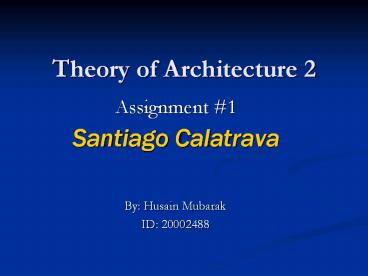Theory of Architecture 2 - PowerPoint PPT Presentation
Title: Theory of Architecture 2
1
Theory of Architecture 2
- Assignment 1
- Santiago Calatrava
By Husain Mubarak ID 20002488
2
Who is Calatrava ? 1/2
- 1951, 28 July Santiago Calatrava Valls, born in
Benimamet near Valencia, Spain. - 1968-1969 Attends Art School in Valencia
- 1969-1974 Studies architecture at the "Escuela
Tecnica Superior de Arquitectura de Valencia"
qualifying as an architect Post-graduate Course
in Urbanism. - 1975-1979 Studies Civil Engineering at the Swiss
Federal Institute of Technology ETH Zurich
3
Who is Calatrava ? 2/2
- 1979-1981 Doctorate in Technical Science of the
Department of Architecture ETH Zurich Ph. D.
Dissertation on the foldability of Spaceframes
Assistant at the Institute for Building Statics
and Construction and for the Institute
Aerodynamics and Lightweight Construction at the
ETH, Zurich . - 1981 Architectural and engineering practice
established in Zurich. - Made many exibitions all over the world.
- Member of many Acadimies.
- Got many prizes and awards as
- - European Glulam Award, (Glued laminated Timber
Construction), Munich in 1991 - - Brunel Award, for Stadelhofen Railway Station,
Zurich in 1992 - - Honor Parize, for Urban Arquitectonic Merit,
Pedreguer in 1993
4
Calatrava's Design Approach 1/2
- He borrows Le Corbusiers expression.
- He believes that geometry is fundamental to
understand architecture, and he approachs his
work through geometry. - Materials and the way they are processed, are
extremely important for design. He says "
Concrete, although an inexpensive material, when
dealt with imaginatively can make beautiful
buildings. It is, however, a difficult material
and requires a great deal of expertise - Guided by the saying "nature is both, mother and
teacher. This saying has guided all my work. He
says " there are many lessons one can draw from
nature, real guiding rules and metaphors from
observing plants and animals.
5
Calatrava's Design Approach 2/2
- He has build a tree-like structures and
frequently his designs recall the form of
skeletons. Behind this is the principle of
repetition. - Nature also is the guiding principle for his
sculptures. The configuration of most of these
works is, derived from the human body. - He recognizes the dynamic aspect of the landcape.
He says A landscape should never be seen as
static. Something dynamic is always happening.
6
Some of Calatravas work
- 1.Turning Torso 1/2
in Sweden, 1999- started out as a sculpture,
shaped by revelation from the human form into a
turning movement. This sculpture has now
evolved to this exciting house.
7
Some of Calatravas work
- Turning Torso 2/2
The height of the Turning Torso building will be
approximately 190 metres. The building will
contain 54 floors, divided into 9 cubical units.
The floors will be of different sizes and the
residence space will increase towards the top of
the construction, as the size of the house core
decreases, while the exterior remains the same
size. The average floor will be 400 square metres.
8
Some of Calatravas work
- 2.Oriente Station 1/2
Lisbon Portugal It came from a large forest of
metal trees, like a row of cut-out muscle men,
rise on a pedestal to cover the space of the
station. The station is made out of three
self-contained parts and is divided into two
levels. The raised level holds the platforms for
the national train network the lower level
connects to the underground and emerges
9
Some of Calatravas work
- Oriente Station 2/2
The structural elements are painted white and the
nerves of these so-called palms spread out to
hold a folding glass roof where geometry and
organic shapes find a synthesis in
abstraction. The main material is concrete, the
bridge parapets are made of glass. The Bus
station is rather straightforward in the
structural sense, but no less expressive.
10
Some of Calatravas work
- 3.Lyon-Satolas TGV Station
Lyon, France. The TGV Station at the
Lyon-Satolas airport, France has the tension of a
bird about to take-off. The almost forty meter
tall steel and concrete structure refers to the
metaphor of a enormous bird with spread out wings
11
Some of Calatravas work
- 4.Montjuïc Telecommunications Tower
Barcelona Spain Built in the heart of the 1992
Olympic site, to carry coverage of the Games. The
tower is innovative in enclosing the circular
platform of microwave dishes. The overall form of
the tower is based on a Calatrava sketch of a
kneeling figure making an offering. The
orientation of the tower means that the shadow of
the central needle on the circular platform acts
as a sundial.
12
Some of Calatravas work
- 5.City of Science
- Museum of Science
Valencia, Spain The latticework of the south
facade adopts the figure of a large bone
structure, reminiscent of the gigantic remains of
the last dinosaurs. concrete structure,
aluminium clad on south-facing side glazed on
north-facing side Length 241 m, width 104 m
13
Some of Calatravas work
- 6.City of Science
- Planetarium
Valencia, Spain resembles an eye, has metal
sides that can be lowered to suggest eyelids The
globe is cradled like the pupil of an eye in a
concrete socket, which is sheltered by the
laminated glass pod.































